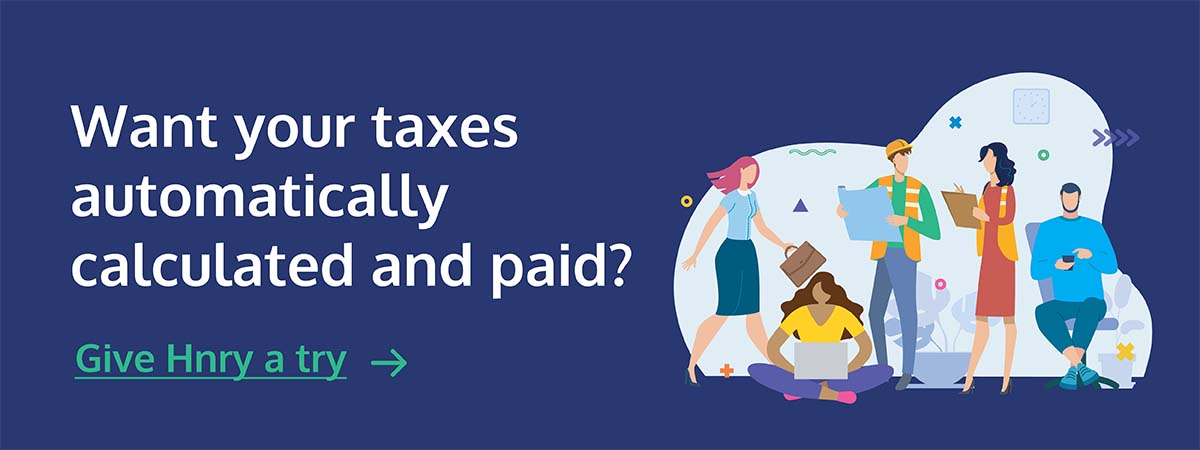For many self-employed tradies, understanding the tax system can be complex, time-consuming, and costly - especially if you’re trying to do it all yourself!
A few simple errors can make the end of the financial year more stressful than it needs to be, resulting in precious time lost and more taxes paid than strictly necessary. This is something we see time and time again at Hnry. Luckily, the most common missteps are easy to avoid, if you know how.
Get ahead of the curve this financial year by avoiding the top mistakes tradies make when filing their taxes.

Mistake #1 - Registering as a company
Many tradies mistakenly believe that they need to register as a company to protect themselves from personal debt liability, take on bigger projects, or hire subcontractors. But this isn’t necessarily the case.
In fact, unless you’re planning to raise capital or bring on business partners, a company structure might actually leave you worse off than if you’d remained a sole trader. Here’s why:
Companies don’t necessarily protect you from personal liability for company debts
As a sole trader, you are personally liable for all debts incurred. That probably doesn’t come as a surprise.
In contrast, as a shareholder of a company, you’re generally only liable for money you’ve borrowed from the company. This usually means shareholders are not personally responsible for company liabilities, and personal assets will be protected.
BUT there are a couple of scenarios where a company doesn’t provide personal protection, and personal assets are on the hook:
- Personal guarantees:
- With small companies, it’s common for banks or suppliers to ask for personal guarantees.
- If a personal guarantee is in place, a company structure essentially provides no protection for personal assets.
- Reckless trading:
- Directors may be found personally liable if the company is engaging in “reckless trading.”
- Reckless trading is essentially running your business in a way that is likely to create a substantial risk of serious loss to the company’s creditors.
Because of these exceptions, setting up a company may end up being more trouble than it’s worth in time, money, and administration.
Companies cost more to set up
Setting up as a sole trader is much simpler and less expensive than setting up a company. For starters, there are no legal or registration fees whatsoever. All you need is:
- your personal IRD number,
- any government licences and permits your business needs to operate,
- and any qualifications or registrations your trade requires you to have.
Conversely, if you want to incorporate a company, you’ll need to:
- reserve a company name ($10 + GST)
- apply to incorporate a company ($118.74 + GST)
- provide contact details for your company
- register for an IRD number
- register all your company’s directors
- register shares and shareholders
If it’s just you owning and operating your business, registering as a company is just not worth the extra time, money, and paperwork.
Companies require more financial admin
If the added fees and legwork aren’t deal-breakers for you, companies also have far more rigorous reporting requirements.
While sole traders list all their income and expenses on their personal tax returns, as a Shareholder and Director of a company, you’ll need to:
- File annual company returns with the Companies Office (including the names and addresses of all Directors on their publicly-searchable register)
- Calculate, pay, and file company Income Tax (IR4) returns annually
- These are far more complex and intensive than personal Income Tax (IR3) returns
- Manage company ACC levies and payments
Each of these is in addition to any tax responsibilities you have as an individual. You’ll still need to manage your individual tax returns, ACC levies (where not covered by the company), and any other personal tax and compliance requirements.
In short: if you’re a sole trader, a company structure requires you to submit almost double the paperwork for little to no benefit.
Accessing money is more complicated in a company structure
As a sole trader, you can draw money directly from your business account. The IRD doesn’t distinguish between personal and business funds, and there are no admin requirements.
To access company earnings, shareholders must complete a formal legal transaction. This can be done by paying wages, declaring dividends, or making personal drawings. Each of these options comes with their own paperwork and tax implications.
On top of this, if you’re not meticulously recording business expenses, valid expenses may be considered personal drawings as well.
It’s an added layer of complexity that simply isn’t necessary.
Mistake #2 - Not claiming deductions you’re entitled to
Forget the proverbial receipt shoebox - you can ditch the end-of-financial-year expenses scramble by knowing what you’re going to claim ahead of time.
Self-employed tradies have a long list of deductible expenses available. Here are just a few:
- Clothing
- Must be either protective clothing, or company-branded
- Equipment purchased
- Items under $1000 can be claimed in one go
- Items over $1000 must be depreciated over the life of the item
- Equipment hired
- Any rental equipment hired to complete a job
- Subcontractors
- Materials
- Vehicle purchases
- 100% claimable if the vehicle is used solely for work; otherwise you can only claim the percentage you use it for business
- Petrol
- 100% claimable if the vehicle is used solely for work; otherwise you can only claim the percentage you use it for business
- Logbook needed for claims over 25%
- Administrative expenses
- Phone bills
- Certifications
- Professional insurance
- Home office expenses
- Research and development expenses
- Professional subscriptions
- If something is for both business and personal use, you can only claim the business usage of the expense
Mistake #3 - Not setting enough aside for taxes
Most sole traders experience an unexpected tax bill or shortfall in their career. To avoid getting into this situation, it’s essential that you set the right amount of money aside from every payment you receive.
To do this correctly, you’ll need to have a reasonable estimate of how much income you’ll earn in the tax year. If you have a good estimate, then any calculator worth its salt will be able to tell you how much to set aside from every payment for income tax.
But, of course, there’s more than just income tax.
On top of income tax, you also need to set aside:
- 2-4% of your income for ACC levies. The exact amount you’ll owe depends on your line of work - it’s higher for higher-risk occupations.
- 15% of every invoice for GST if you’re above the $60,000 self-employed income threshold. This is an extra charge for your client, not a deduction from your pay.
- 12% of every dollar you earn above the minimum threshold (currently $22,828) for student loan repayments (if you have one).
- contributions to your KiwiSaver account. You’ll want to make sure you’re contributing at least $1,042.86 before June 30th every year in order to receive the full government contribution of $521.43.
Proactively setting aside the right amount of taxes throughout the year will give you peace of mind. No more nasty tax-bill surprises that force you to dig into your savings - or worse, default and incur penalties.
What you get with Hnry
As a sole trader, Hnry will automate your tax obligations so you’ll never need to think about tax again.
Automatic tax calculations and payments
Whenever you get paid, Hnry automatically calculates, deducts and pays all of your taxes on your behalf, so you’re always up to date on your tax payments. Income tax, GST, ACC levies, student loans, even KiwiSaver - all calculated and paid as you earn!
All expenses reviewed and tax returns filed by our accountants
Hnry’s accountants will approve and claim your expenses for you, as well as file your returns whenever they’re due. It’s all part of the service.
As a sole trader, you can have complete confidence that your taxes are filed correctly - and on time!
Share on:

